How to Make More Money with Your Gaming Machine?
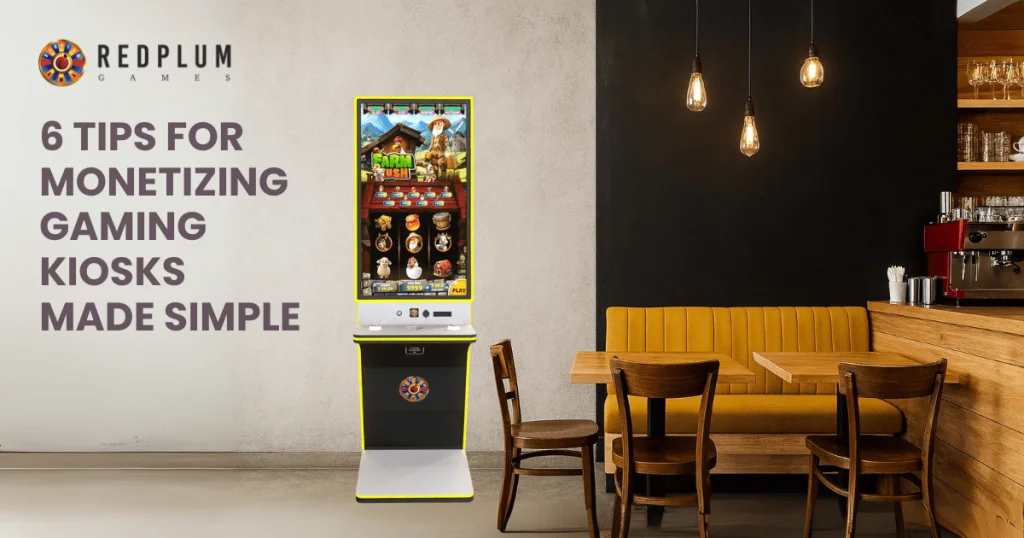
Gaming kiosks are popping up all over the place. Why? Because people love easy, fun entertainment that doesn’t cost a fortune. Whether it’s in a mall corner, a café, or at an event, these setups draw in players like bees to honey.
They’re not like full arcades that eat up space and money. A kiosk can be built with a few good consoles, a screen, and decent chairs. Simple setup. Low monthly overhead. No need to overthink it.
With just the basics, owners can see income roll in daily. That’s why many small business owners look for ways to monetize a gaming kiosk without a huge investment or staff. Not bad, right? You don’t need a huge team or big storefront either. A smart setup can handle itself, especially when paired with tools like RedPlum Connect, which makes life easier for arcade kiosk owners.
Here’s why people are jumping on it:
- Easy to start – Minimal equipment, no huge space needed
- Fast return – With steady use, many break even within months
- Built-in demand – Kids, teens, even adults are always looking for something to do
- Scalable – Start small, grow to multiple booths when ready
It’s kind of a no-brainer for small business folks or side-hustlers. Just set it up right, keep it running smooth, and let the players do the rest.
Why a Monetization Strategy Matters?
Just dropping a console into a booth and hoping for the best? That won’t cut it. A gaming kiosk isn’t just some cool setup it’s a real business. And if you want it to make money, you’ve got to treat it that way.
Think of it like this: without a plan, you’re just guessing. You might make a few bucks here and there, sure, but consistent income? That takes structure. It takes pricing that makes sense. And you’ve got to keep track of every session, every minute, every dollar.
This is where smart tools come into play. If you’re thinking about how to monetize an arcade kiosk the right way, it starts with having tools that keep things tight and trackable.
- Track playtime so you’re not undercharging
- Control start/stop without being there
- Monitor revenue from your phone
- Adjust pricing anytime you want
RedPlum Connect does all that and more. It gives you full control from anywhere. No more chasing down timers or writing stuff on paper. You set the rules. The system handles the rest.
If you’re in this to earn, not just entertain, a clear strategy saves time, use analytics to improve skill game profits, and helps avoid those little mistakes that eat up your bottom line. Otherwise, it’s just an expensive toy.
Understand the Profit Potential How Gaming Kiosks Generate Income
Gaming kiosks can bring in steady cash if you play your cards right. These setups earn money in a few simple ways. Some folks are surprised how fast it adds up.
How the Money Comes In
Pay-Per-Play – Charge each time someone starts a session
Timed Access – Sell 15, 30, or 60-minute blocks
Special Events or Tournaments – Collect entry fees for friendly matches
In-Game Upgrades – Some setups allow paid boosts or add-ons
Think of it like a snack machine for games. Players walk by, play, and leave happy. If it’s in a place with traffic, that little machine starts pulling its weight fast.
Put one in a mall corner or near a coffee spot, and you’re in business. Folks love quick fun they don’t have to think about. That’s your edge.
Key Cost and Revenue Factors
Nothing runs on air. There are a few moving parts behind the scenes. Costs are real, but they’re not scary if you plan well.
What You Might Spend On
Buying or Leasing the Machine – Upfront vs. monthly
Electricity – Low, but it’s always running
Wi-Fi or Data Plans – Needed for some games
Game Licenses – Keeps you legal
Fixes and Maintenance – Machines break; it’s part of the game
Cleaning Supplies – Nobody wants sticky buttons
You don’t want stuff breaking down during the rush. Keep it in shape, and your customers stick around.
Ways to Bring In More
Use Trending Games – What’s hot gets played
Sell Bundles – Give a little extra time for bulk play
Place It Right – Traffic means players
Team Up With Shops – Split income for shared space
Even slow and steady play can build up over weeks. That’s the real power here. No need for a huge staff or big overhead to make this work.
Types of Gaming Kiosks and Their Revenue Focus
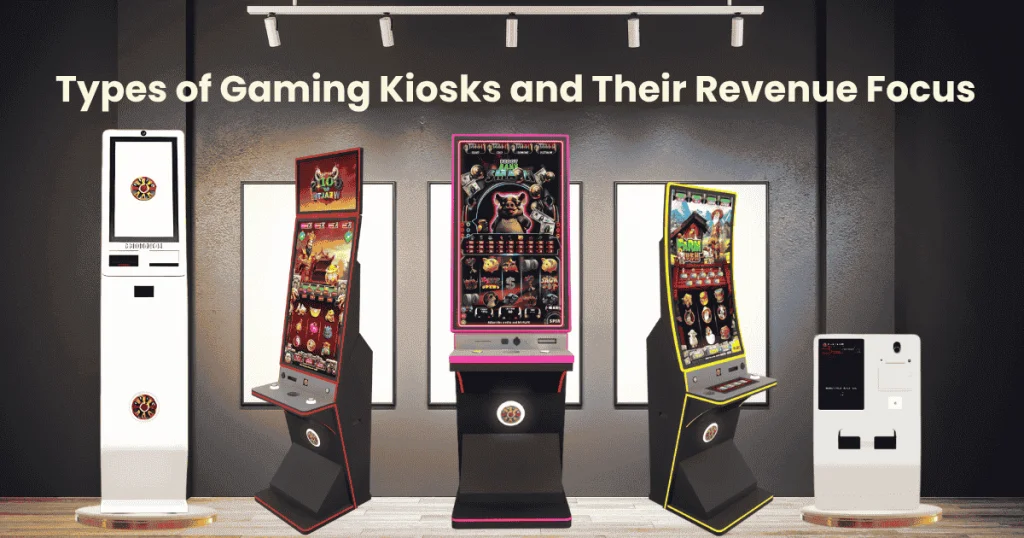
Not all kiosks are built for the same kind of fun. Some are quick-play setups, others are built for challenges. Each one brings in money in its own way. Set it up right, and you’ll have players coming back again and again. Miss the mark, and your seats stay empty. Your gaming kiosk income model depends a lot on matching the setup with who’s playing and what keeps them coming back will help to improve player retention ratio.
Here’s what’s out there:
- Standard console booths use game systems like PS5, Xbox, or Switch. These are the no-fuss setups. Players sit, tap play, and they’re off. You can run games like NBA 2K, FIFA, or Call of Duty. They don’t take up much room either. Cafés, shopping centers, and college lounges eat these up.
- Skill-based stations are where things get serious. Think of fighting games, racing challenges, or even casino-style games where allowed. Players want to win here, not just relax. More wins, more play. Some stick around for hours, especially when they’re chasing high scores or showing off in front of friends. A strong skill-based game kiosk keeps players locked in longer and that means more sessions, more revenue.
- Redemption setups hand out tickets or points. You score well, you get stuff. Kids love it. Parents like it too because it feels like a game with a prize. These are best for birthday zones, play areas, and malls that have lots of foot traffic. It’s a simple hook, but it works. If you’re building a gaming business, this style is a proven favorite for family-friendly foot traffic.
Different crowds, different habits. Here’s a quick view:
- Kids chase prizes. They’re in it for fun, lights, and cool rewards.
- Teens want speed, graphics, and something they can brag about.
- Office workers don’t have time. Quick matches, low fuss, back to work.
- Event-goers love games with energy. Something big, bright, and loud.
People move fast. They don’t stop unless something grabs their attention. Your kiosk should do just that. Give the right kind of player the right kind of game, and money won’t be far behind. Simple as that.
Choosing the Right Equipment and Systems
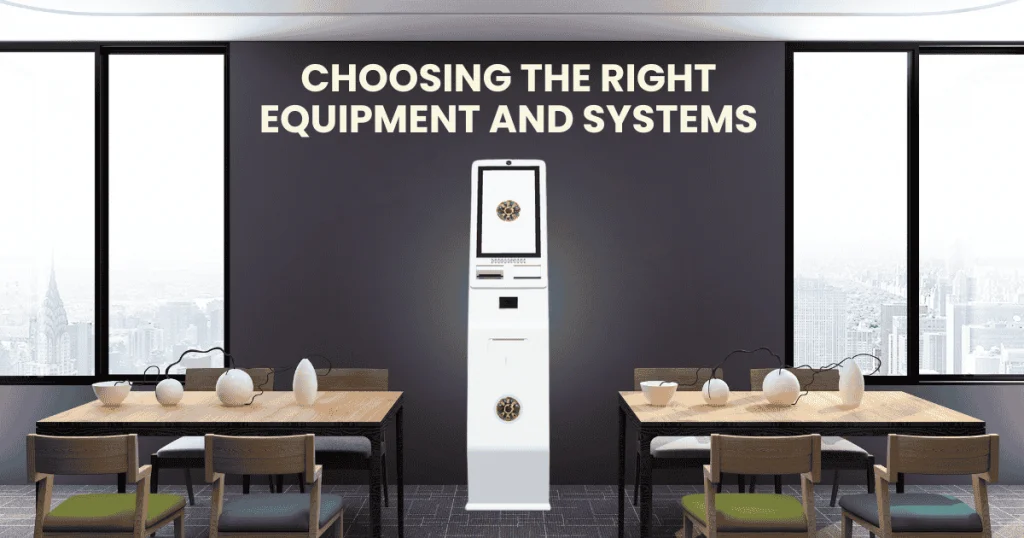
You can’t just throw together a console and call it done. That’s not how you build something that earns. The best setup for a gaming kiosk business starts with gear that works well and keeps players coming back.
If the gear doesn’t work right or feels cheap, people notice and they bounce. So, setting it up with the right stuff from the start? That’s where the money starts rolling in.
Let’s start with the basics:
- Gaming machines should be reliable and up to date with no outdated systems or unstable software.
- Kiosks must deliver smooth and fast gameplay without long load times or lag.
- Players expect quick response and steady performance or they’ll lose interest fast.
- Whether it’s a single gaming machine or part of a larger kiosk setup, it should run clean every time.
- A slow or buggy kiosk setup turns players away and cuts into your slot skill game earnings.
Now, let’s talk software. Don’t skip it.
- You’ll need legal copies of every game. No shortcuts here. If your setup’s flagged, you’ll lose business real fast.
- Use a session timer. Whether it’s time-based or credit-based, it keeps everything running fair. And it helps avoid arguments over playtime.
- For setups using a touch screen game kiosk, having responsive software is just as important as the hardware itself.
- For a smooth digital gaming kiosk setup, make sure both hardware and software are aligned from day one.
Here’s the game-changer: RedPlum Connect. This admin-only tool lets you:
- Track booth usage
- Turn stations on and off remotely
- Review earnings by day, week, or month
- Set pricing and session limits without touching the hardware
It’s kind of like having an extra manager in your pocket. No need to hover over the booth. You can be across town and still know what’s going on.
And finally choose the right Gaming Kiosk for your location and layout.
- Pick high-traffic spots where people already hang out
- Set screens at eye level so they catch attention fast
- Space out booths so players feel relaxed, not crammed
- Keep everything clean and easy to spot from across the room
A sloppy setup gets skipped. A clean, well-placed, fully working station? That one gets played. And paid. A tight arcade kiosk setup makes the booth look sharp and helps attract attention even in busy spaces. This kind of setup turns a regular console setup into a real gaming booth business that pays for itself fast.
How to Increase Revenue from Skill Game Kiosks?
Making revenue from your gaming kiosk isn’t just about charging for playtime. The smart setups earn from multiple angles. You don’t need to overcomplicate it. Mix a few options, set it up clean, and let the system do most of the work. Here’s what works. The right kiosk monetization plan turns even a single station into a steady earner with low daily effort. When planned right, your gaming kiosk revenue generation can stack up from several sources, not just session time.
A. Time-Based Play (Core Income)
This is your bread and butter. Charge by the minute, hour, or fixed session.
- Players pay to play
- The session timer runs automatically
- Everything’s controlled in your RedPlum Connect panel
It’s a simple move for anyone asking how to generate revenue with a gaming station without standing there all day.
B. Prepaid Bundles & Memberships
Give players a deal they can’t pass up.
- Sell 5-hour packs, 10-hour bundles, or even all-you-can-play monthly passes
- RedPlum Connect tracks usage and sets limits
- You stay in control while giving customers more reasons to come back
This is a go-to method for anyone thinking about how to monetize gaming kiosks while keeping traffic steady.
C. Event Rentals
Got a birthday party or a tournament group? Let them book the whole setup.
- Charge per hour or by package
- Use your admin calendar to block off times
- Track bookings without needing sticky notes or spreadsheets
People love private gaming sessions. You’ll see solid income, especially on weekends or holidays.
D. Loyalty Rewards & Progressive Incentives
Players like to feel appreciated. Simple perks go a long way.
- Offer free time after a set number of visits
- Give small bonuses after a spending milestone
- Tier pricing so frequent users get better deals
This keeps the regulars happy and coming back. Plus, word gets around.
E. Tournaments and Challenges
When people compete, they stay longer. And they bring friends.
- Host small weekend events
- Charge entry fees and toss in a fun prize
- Promote scores or winners on a small wall display or screen
It builds a vibe around your booth. Players love the spotlight.
F. Add-on Sales
You’d be surprised how much snacks can boost skill game profits.
- Sell drinks, chips, gum, or small game accessories
- Offer custom gamepads or headset rentals
- Keep items within reach to boost impulse buys
While the players enjoy top-performing skill games, others buy and browse. That adds up fast. Extra sales like snacks or gear can quietly boost arcade kiosk profit without needing extra space or effort. These extra touches are easy gaming booth income ideas that pad your bottom line without extra work.
G. Digital Ads & Side Screens
You’ve got screen space use it smart.
- Partner with local businesses
- Show banners, logos, or QR offers during idle time
- Let sponsors place short videos or coupon promos
Ads won’t bother players if placed right, and you make passive income off every view. Even screen time becomes part of your gaming station monetization strategy when it’s used smartly.
Stacking these streams builds a solid base. Don’t rely on just one. Mix things up, test what clicks, and let RedPlum Connect help keep track of it all. Let the setup work harder so you don’t have to.
Optimize the Experience to Keep Users Coming
Getting players through the door is one thing. Keeping them interested week after week? That takes a bit of work. If the booth always looks and feels the same, folks will get bored and move on. Mix it up just enough to keep it fresh.
Here’s how to keep things exciting:
- Rotate your best games every few weeks for high traffic areas
- Keep the fan favorites, but drop slow performers
- Add trending titles or local hits when you spot them
Some kiosks sit empty because the game list never changes. Don’t let yours collect dust.
- Adjust your pricing during slow times
- Offer mini-discounts on weekday mornings or late evenings
- Set up short time-based promotions like “Play 20 minutes, get 10 more”
People love a good deal, even if it’s small. Just a little change in timing or offer can pull someone in.
Now here’s the kicker use your data.
RedPlum Connect gives you real-time info. Check:
- What games get played the most
- Which hours are the busiest or slowest
- How long players stick around and how often they return
Once you see the numbers, tweak the setup. Add more of what works. Cut what doesn’t. There’s no guesswork when the system shows you what’s hot and what’s not.
And every few weeks? Walk the space yourself. See it like a customer would. If something looks tired or feels off, fix it before they notice. That’s how you stay one step ahead.
Boost Revenue with Smart Offers
Want to keep your income steady and even push it higher? Throw in a few clever extras. You don’t need anything fancy just offers that feel fresh, fair, and fun. People love the feeling of getting more for their money. So give them a reason to play more often.
Start with VIP memberships:
- Priority access during peak times
- Special pricing on longer sessions
- Early access to new games or features
This setup makes regulars feel special. When folks feel like insiders, they come back more.
Now layer in some seasonal or weekend-only features:
- Add exclusive game modes during holidays
- Unlock multiplayer bonuses only on Saturdays
- Drop surprise mini-tournaments during school breaks
It doesn’t have to be complicated. Just keep things moving and players will stick around.
Team up with local brands:
- Offer game credits with a pizza purchase next door
- Add sponsor logos to your screens in exchange for giveaways
- Run a “shop and play” deal with a nearby clothing store
It’s a win for you, and a win for the other business. Plus, players get something extra without asking for it.
And don’t sleep on your prize counter. The right rewards can double your traffic.
Pick prizes that actually matter:
- Budget headphones
- Branded keychains or plush toys
- Low-cost gift cards
- Stickers or collectible items for repeat players
Switch them out often. Keep the surprise alive.
Smart offers don’t have to be loud or flashy. They just need to make people feel like they’re getting a little extra. Do that, and they’ll keep playing, spending, and talking about your kiosk long after the game ends.
Track & Protect Your Setup With RedPlum Connect and Admin Tools
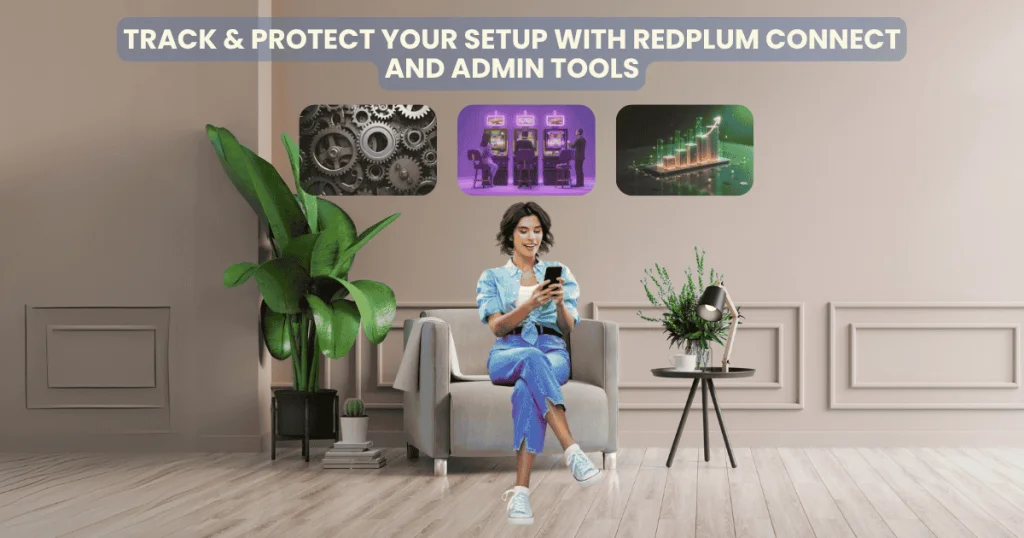
Running a kiosk blindfolded? That’s a fast way to lose cash. You need eyes on everything, even if you’re not there. That’s where tech like RedPlum Connect steps in and makes things simple. Keeps the chaos out and the cash flow smooth. This kind of self-serve gaming kiosk setup means fewer headaches and more time focusing on what works.
Let’s break down what you can do:
With solid gaming kiosk admin control, you can avoid slip-ups and make sure every booth earns like it should.
- Check booth activity live without being on-site
- Know which station’s being used, for how long, and by who
- No guesswork just straight numbers at your fingertips
Ever had someone sneak extra time by unplugging the timer? Yeah, that trick won’t fly anymore.
- Start and stop sessions remotely
- Freeze a booth if something looks off
- Pause gameplay during downtime or for quick checks
Feels good knowing you’re always in control, even if you’re sipping chai two streets away.
RedPlum Connect also gives you clean earning summaries:
- Track what came in today, last week, or the whole month
- Spot slow days and high-traffic windows
- See which booth is pulling weight and which one needs help
No more guessing your income. It’s all there, updated in real time.
Now, here’s a lifesaver maintenance logging:
- Note any breakdowns, cable swaps, or software crashes
- Get alerts on issues fast
- Track downtime so you can plan fixes before people start walking away
No one likes walking up to a broken machine. A little tracking saves a lot of frustration.
With this setup, things don’t fall through the cracks. You’re not just running a booth you’re running it smart. And that’s how you keep everything tight without being there 24/7.
Legal, Licensing & Responsible Use
It’s easy to focus only on gear and games. But without the right paperwork and rules, the whole setup can hit a wall. And trust us, no one wants a fine or shutdown notice because something small got missed. Handle the basics, and you’ll avoid the headache later.
Start with the local laws:
- Some areas need permits for coin-op or game zone machines
- Others might ask for a general business license
- Some cities treat gaming kiosks like arcades, so don’t assume it’s all chill
Check with your town office or local authority. One quick visit saves trouble later. Wherever you set up, knowing the local game zone business model rules helps you stay ahead and out of trouble.
Now, post clear rules at your booth:
- Add a quick sign with “how to play” and “what not to do”
- Drop in a simple disclaimer about game content, use time, or age limits
- Print it big enough so even folks just walking by can read it
It helps manage expectations and protects you too.
Keep your content clean if it’s in a public space:
- No violent, adult, or age-restricted games if kids have open access
- For setups inside malls or events, choose family-safe titles
- If you’re unsure, skip the risk and pick a different game
It’s better to lose one edgy game than deal with angry parents or mall managers.
If you need permits, don’t wait:
- Apply early it can take time
- Save copies of everything
- Keep it posted or ready to show in case anyone asks
Running a kiosk should feel fun, not stressful. So, knock out the boring stuff upfront. That way, you’re not scrambling later if someone official drops by unannounced.
Final Tips to Maximize Profit with Arcade Kiosk
Running a gaming kiosk is not just about plugging in some consoles and letting them sit. Real money comes from working smart, adjusting often, and paying attention to how people use your setup. The truth is, the little things usually decide if you stay busy or go quiet.
Try different pricing setups until something clicks. One location might do well with hourly play, while another prefers short sessions or bundled minutes. What works today might need a change next month. Staying flexible keeps you ahead.
Instead of chasing only new visitors, give repeat users a reason to come back. Maybe they get bonus time after a few visits. Maybe a free session once in a while. These folks bring in more money over time, and they often tell friends too.
RedPlum Games’ RedPlum Connect helps a ton here. It lets you run things without standing next to the booth all day. You can manage sessions, check income, or stop a booth from anywhere. That saves on staffing and cuts mistakes.
Keep your games fresh. When something new gets popular, add it quickly. If your booth is known for having the latest titles, players will notice. Gaming kiosk profitability depends a lot on staying current and giving people something new to try each visit. You can also rotate older games out and bring in different styles to keep people curious.
And do not ignore the basics. Broken screens, dusty chairs, and loud fans will turn people away. A clean, cool, and smooth-running booth makes people stay longer and feel better about spending money.
No secret formula needed. Just run it clean, stay sharp, and give people a reason to come back. That is what builds steady profit. With a few smart tweaks, even a small arcade business profit can grow quickly month over month.
Frequently Asked Questions
Yes. With tools like RedPlum Connect, you can manage everything remotely. You don’t need to stand next to the booth all day.
Charge by time, sell bundles, host events, add snacks, or run ads on your screens. Multiple small streams stack up quick.
Not always. Some places need permits or treat it like an arcade. Check with your local office before setting up.
It helps, especially for online games or updates. But for local play, some setups can run offline once the games are loaded.
Use RedPlum Connect or similar admin tools. You’ll see play sessions, earnings, and can even shut down a station from your phone.
Author
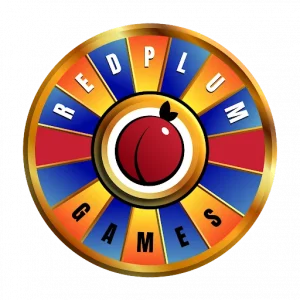
I'm a gaming journalist with 8+ years of experience covering game reviews, industry news, and esports. When I'm not writing, I'm exploring RPGs and competing in competitive shooters.
